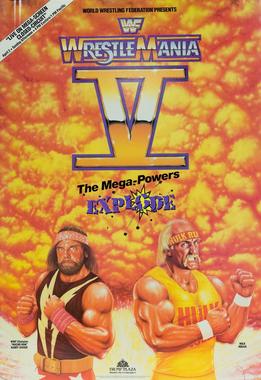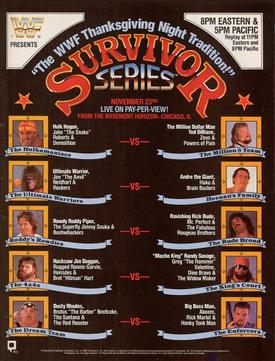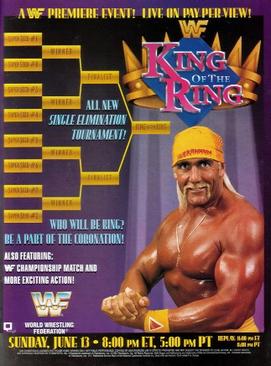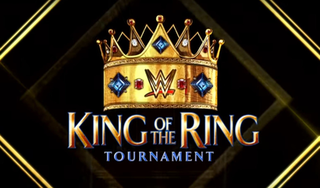Related Research Articles

Theodore Marvin DiBiase Sr. is an American retired professional wrestler, manager, ordained minister and color commentator. He is signed to WWE as of 2023, where he works in their Legends program. DiBiase achieved championship success in a number of wrestling promotions, holding thirty titles during his professional wrestling career. He is best recalled by mainstream audiences for his time in the World Wrestling Federation (WWF), where he wrestled as "the Million Dollar Man" Ted DiBiase. He has been named as one of the best technical wrestlers, and greatest villains, in pro wrestling history.

WrestleMania IV was the fourth annual WrestleMania professional wrestling pay-per-view (PPV) event produced by the World Wrestling Federation. The event took place on March 27, 1988, at Boardwalk Hall in Atlantic City, New Jersey. The announced attendance of the event was 19,199.

WrestleMania V was the fifth annual WrestleMania professional wrestling pay-per-view (PPV) event produced by the World Wrestling Federation. It took place on April 2, 1989, at the Boardwalk Hall in Atlantic City, New Jersey. A total of 14 matches were contested at the event.

James Edward Duggan Jr., better known by his ring name "Hacksaw" Jim Duggan, is an American retired professional wrestler. His best-known character is a patriot who swings a 2x4 at opponents, cries "Hoooooo!" continually with a thumbs up and leads chants of U-S-A!

The Mega Bucks were a professional wrestling tag team that competed in the World Wrestling Federation (WWF) in 1988. The team, consisting of "The Million Dollar Man" Ted DiBiase and André the Giant, was formed in a storyline that saw DiBiase purchase André's contract from fellow manager Bobby Heenan. André was to win the WWF World Heavyweight Championship from Hulk Hogan, but then he attempted to sell the belt to DiBiase. The title was vacated, but DiBiase and André were then scheduled to face Hogan and Macho Man Randy Savage in a match at SummerSlam, which Hogan and Savage won. After the match, DiBiase and André went their separate ways and the team was dissolved.

The 1988 SummerSlam was the inaugural SummerSlam professional wrestling pay-per-view (PPV) event produced by the World Wrestling Federation. It took place on August 29, 1988, at Madison Square Garden in New York City, New York. The pay-per-view was created to help the company compete against rival promotion Jim Crockett Promotions. It was one of the first four annual pay-per-view events produced by the WWF, along with WrestleMania, the Royal Rumble, and Survivor Series, which were eventually dubbed the "big four".

The 1990 SummerSlam was the third annual SummerSlam professional wrestling pay-per-view event produced by the World Wrestling Federation. It took place on August 27, 1990, at The Spectrum in Philadelphia, Pennsylvania. The card consisted of 10 televised matches, including two main events. The Ultimate Warrior successfully defended the WWF World Heavyweight Championship against Rick Rude in a Steel Cage match, and Hulk Hogan defeated Earthquake by countout.

The 1988 Royal Rumble was the inaugural Royal Rumble professional wrestling event produced by the World Wrestling Federation. It took place on January 24, 1988, at the Copps Coliseum in Hamilton, Ontario, Canada. The event aired as a television special on the USA Network on the same night as Jim Crockett Promotions' Bunkhouse Stampede pay-per-view (PPV) and was centered on the Royal Rumble match, a modified battle royal in which participants enter at timed intervals instead of all beginning in the ring at the same time. It would be the only Royal Rumble event to broadcast as a television special, as beginning with the 1989 event, it began airing on pay-per-view. After the launch of the WWE Network in 2014, this inaugural Royal Rumble was included with the rest of the Royal Rumble events in the PPV section.

The 1994 Royal Rumble was the seventh annual Royal Rumble professional wrestling pay-per-view (PPV) event produced by the World Wrestling Federation. It took place on Saturday, January 22, 1994, at the Providence Civic Center in Providence, Rhode Island—the final Royal Rumble held on a Saturday until the 2022 event. Six matches were contested at the event, including one dark match.

The 1991 Royal Rumble was the fourth annual Royal Rumble professional wrestling pay-per-view (PPV) event produced by the World Wrestling Federation. It took place on January 19, 1991, at the Miami Arena in Miami, Florida. It centered on the Royal Rumble match, a modified battle royal in which participants enter at timed intervals instead of all beginning in the ring at the same time.

The 1990 Royal Rumble was the third annual Royal Rumble professional wrestling pay-per-view (PPV) event produced by the World Wrestling Federation. It took place on January 21, 1990, at the Orlando Arena in Orlando, Florida. It centered on the Royal Rumble match, a modified battle royal in which participants enter at timed intervals instead of all beginning in the ring at the same time.

The 1989 Royal Rumble was the second annual Royal Rumble professional wrestling event produced by the World Wrestling Federation. After the inaugural event aired as a television special, the 1989 event aired on pay-per-view (PPV), thus becoming one of the WWF's original four annual PPV events, along with WrestleMania, SummerSlam, and Survivor Series, which would become recognized as the "Big Four". It took place on January 15, 1989, at The Summit in Houston, Texas. It centered on the Royal Rumble match, a modified battle royal in which participants enter at timed intervals instead of all beginning in the ring at the same time.

The 1989 Survivor Series was the third annual Survivor Series professional wrestling pay-per-view (PPV) event produced by the World Wrestling Federation. It took place on Thanksgiving Day on November 23, 1989, at the Rosemont Horizon in the Chicago suburb of Rosemont, Illinois.

The 1993 King of the Ring was the inaugural King of the Ring professional wrestling pay-per-view (PPV) event produced by the World Wrestling Federation and featured the seventh King of the Ring tournament. It was the first of ten King of the Ring events produced as pay-per-views; an 11th exclusively aired on the company's livestreaming service, the WWE Network. The inaugural event took place on June 13, 1993, at the Nutter Center in Fairborn, Ohio. Ten matches were held at the event.

In Your House 8: Beware of Dog was the eighth In Your House professional wrestling pay-per-view (PPV) event produced by the World Wrestling Federation. The event was originally only scheduled to take place on May 26, 1996, from the Florence Civic Center in Florence, South Carolina, but a second night of the event also took place on May 28, 1996, at the North Charleston Coliseum in North Charleston, South Carolina.
The 1987 King of the Ring was the third annual King of the Ring professional wrestling tournament produced by the World Wrestling Federation. The tournament was held on September 4, 1987 at the Providence Civic Center in Providence, Rhode Island as a special non-televised house show. The 1987 tournament was won by Randy Savage. In addition to the tournament, there was one other match during the night. In this match Jake Roberts defeated WWF Intercontinental Champion The Honky Tonk Man with Jimmy Hart via disqualification, after Hart accidentally hit Honky Tonk Man with the megaphone.
The 1989 King of the Ring was the fifth annual King of the Ring professional wrestling tournament produced by the World Wrestling Federation. The tournament was held on October 14, 1989 at the Providence Civic Center in Providence, Rhode Island as a special non-televised house show. The 1989 tournament was won by Tito Santana. A tournament was not held in 1990 but returned in 1991.
The 1991 King of the Ring was the sixth King of the Ring professional wrestling tournament produced by the World Wrestling Federation. The tournament was held on September 7, 1991 at the Providence Civic Center in Providence, Rhode Island as a special non-televised house show. The 1991 tournament was won by Bret Hart. In addition to the tournament, there was only one other match during the night. In this match The Beverly Brothers defeated The Bushwhackers in a tag team match. A tournament did not occur in 1992 but returned in 1993 as the promotion's annual June pay-per-view.

The André the Giant–Hulk Hogan rivalry was a professional wrestling rivalry between wrestlers André the Giant and Hulk Hogan that took place in the World Wrestling Federation.

The King of the Ring tournament is a men's professional wrestling single-elimination tournament held periodically by WWE, a Connecticut-based professional wrestling promotion. Established in 1985, the winner of the inaugural tournament was Don Muraco. The prize for winning the tournament is being crowned the "King of the Ring"; some wrestlers have incorporated this into their character, such as adorning king's attire and acting and speaking with a regal attitude. Only one tournament awarded an additional reward, which was the 2002 tournament where winner Brock Lesnar received a match for the WWE Undisputed Championship at SummerSlam (2002). The tournament is also notable for beginning Stone Cold Steve Austin's rise to stardom after he won the 1996 tournament.
References
- 1 2 3 WWF King Of The Ring 1988
- ↑ Beaston, Erik (August 18, 2019). "WWE King of the Ring: Everything You Need to Know About Historical Tournament". Bleacher Report . Retrieved April 9, 2021.
- ↑ Grabianowski, Ed (2006-01-13). "How Pro Wrestling Works". HowStuffWorks. Discovery Communications. Archived from the original on March 6, 2012. Retrieved March 5, 2012.
- ↑ "King of the Ring 88 - Providence, RI - Civic Center - October 16, 1988 (6,700)". The History of WWE. Retrieved October 8, 2019.
- ↑ "WWF King of the Ring '88 at Providence Civic Center wrestling results - Internet Wrestling Database". www.profightdb.com. Retrieved 2019-10-08.
- ↑ Ted DiBiase: The Million Dollar Man, p.162, Ted DiBiase with Tom Caiazzo, Pocket Books, New York, 2008, ISBN 978-1-4165-5890-3